- DETERRENCE: Back to the drawing board: the need for sound science in U.S. missile defense
- DPRK: (China’s) Foreign Ministry to hold strategic talks with DPRK
- ENERGY SECURITY: Four energy policies can keep the 2 °C climate goal alive
- GOVERNANCE AND CIVIL SOCIETY: N. Korea alters definition of “denuclearization”
- CLIMATE CHANGE ADAPTATION: Planning, building and insuring: adaptation of built environment to climate change induced increased intensity of natural hazards
- CLIMATE CHANGE AND SECURITY: Climate Change and Conflict: Avoiding small talk about the weather
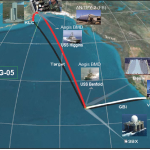 DETERRENCE: Back to the drawing board: the need for sound science in U.S. missile defense, Phillip Coyle (13 February 2013)
DETERRENCE: Back to the drawing board: the need for sound science in U.S. missile defense, Phillip Coyle (13 February 2013)
If US Missile Defense Agency pursues scientific dead ends, then US missile defenses will be expensive pipe dreams, cobbled together from components that do not work together in a “system of systems,” failing to satisfy the mission.
- Target malfunctions imperil U.S. missile defense effort, The Pentagon is repeatedly taking risks by using old or untested missile parts, and paying hundreds of millions of dollars in extra costs, Richard Sia, Center For Public Integrity (30 May 2013)
- Kerry in China to seek help in Korea crisis [tells Chinese that US missile defenses could be cut back if DPRK abandons its nuclear program], Michael Gordon, New York Times (13 April 2013)
- A flawed and dangerous U.S. missile defense plan, George Lewis and Theodore Postol, Arms Control Today (May 2010)
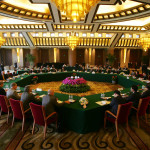 DPRK: (China’s) Foreign Ministry to hold strategic talks with DPRK, China Daily (18 June 2013)
DPRK: (China’s) Foreign Ministry to hold strategic talks with DPRK, China Daily (18 June 2013)
North Korea’s relationship with China is subtly yet perceptibly changing. Kim Kye-gwan, former head of North Korea’s Six Party Talks delegation, will be in Beijing shortly before South Korea’s President visits and shortly after the South Korean Chairman of the Joint Chiefs of Staff visited. Notably, Kim’s visit is State to State; one of the few NOT Party to Party discussions. No overarching framework has been articulated for the talks.
- What will be on N. Korean Vice FM’s agenda in Beijing? Eoh Jin-joo, Arirang News (18 June 2013)
- Beijing to hold talks with North Korean Minister, Ryamond Li and Press Agencies, South China Morning Post (18 June 2013)
- Foreign Assistance to North Korea, Mark Manying and Mary Beth Nikitin, Congressional Research Service (11 June 2013) [PDF, 382 KB]
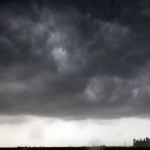 ENERGY SECURITY: Four energy policies can keep the 2 °C climate goal alive, IEA (10 June 2013)
ENERGY SECURITY: Four energy policies can keep the 2 °C climate goal alive, IEA (10 June 2013)
Keeping the goal alive only by setting an ambitious but doable goal for 2020; how one goes from there to drastic cuts by 2050 and whether international negotiations are a help or a hindrance is the bigger question. IEA also warns of higher warming, while NY Times points out “important gaps in our knowledge of the climate system” and the FCCC talks in Bonn break down on disagreements over “hot air”. Reality fits the metaphor.
- Waiting on new climate deal ‘will set world on a path to 5C warming, Fiona Harvey, Guardian (10 June 2013)
- What to make of a warming plateau, Justin Gillis, New York Times (11 June 2013)
- UN global warming talks blocked by Russia set back six months, Alessandro Vitelli and Stefan Nicola, Bloomberg Business Week (14 June 2013)
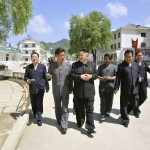 GOVERNANCE AND CIVIL SOCIETY: N. Korea alters definition of “denuclearization”, Gil Yun-hyung, Hankyoreh (17 June 2013)
GOVERNANCE AND CIVIL SOCIETY: N. Korea alters definition of “denuclearization”, Gil Yun-hyung, Hankyoreh (17 June 2013)
The DPRK has called for high-level talks with the US following the breakdown of talks with the ROK last week. The DPRK says there must be no preconditions to US talks as the DPRK National Defense Commission released a statement further redefining “denuclearization” to include both Koreas. Some see the DPRK’s latest moves for dialogue as a means for gaining back favor with China rather than sincere offers.
- North Korea wants to hold high-level talks with U.S., Jane Chung and Roberta Rampton, Reuters (16 June 2013)
- North’s top nuke envoy makes visit to Beijing, Sarah Kim, Joongang Ilbo (19 June 2013)
- Is there method in N. Korea’s diplomatic madness? Chosun Ilbo (18 June 2013)
 CLIMATE CHANGE ADAPTATION: Planning, building and insuring: adaptation of built environment to climate change induced increased intensity of natural hazards, David King et al., James Cook University and NCCARF (2013) [4.41 MB, PDF]
CLIMATE CHANGE ADAPTATION: Planning, building and insuring: adaptation of built environment to climate change induced increased intensity of natural hazards, David King et al., James Cook University and NCCARF (2013) [4.41 MB, PDF]
The complexity and social and economic importance of the built environment requires focused governance to develop adaptation and hazard mitigation for community resilience to climate change and to predicted extreme events. Where issues of adaptation and hazard mitigation impact public safety, they are best tackled through legislation, codes and policy.
- Lessons learnt from post-bushfire surveys at the urban interface in Australia, Raphaele Blanchi, Justin E. Leonard and Robert H. Leicester, V International Conference on Forest Fire Research (2006) [1.65 MB, PDF]
- Assessment of damage risks to residential buildings and cost–benefit of mitigation strategies considering hurricane and earthquake hazards, Yue Li, Journal of Performance of Constructed Facilities, vol. 26, no. 1(2012)
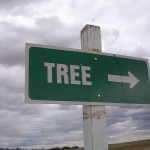 CLIMATE CHANGE AND SECURITY: Climate Change and Conflict: Avoiding small talk about the weather, Emily Meierding, International Studies Review, Vol. 15, No. 2 (June 2013)
CLIMATE CHANGE AND SECURITY: Climate Change and Conflict: Avoiding small talk about the weather, Emily Meierding, International Studies Review, Vol. 15, No. 2 (June 2013)
Rather than developing claims that are specific to climate change–conflict relationships, analysts tend to import arguments from the earlier environmental literatures. It is often unclear whether the climate change–conflict relationship is actually being tested. Recommendations: incorporation of agricultural variables into models; emphasis on conditional effects, with attention to local institutions; and a shift from climate change to climate uncertainty.
- For Southeast Asia, climate change is just as dangerous, Le Dinh Tinh, Malaysian Insider (3 June 2013)
- Forest carbon won’t be tradable commodity, climate expert says, Stefan Nicola and Alessandro Vitelli, Bloomberg News (14 June 2013)
- Peak soil: industrial civilisation is on the verge of eating itself, Nafeez Ahmed, Earth Insight, The Guardian (7 June 2013)
The Nautilus Peace and Security Weekly Report presents articles and full length reports each week in six categories: Austral security, nuclear deterrence, energy security, climate change and security, the DPRK, climate change adaptation and governance and civil society. Our team of contributors carefully select items that highlight the links between these themes and the three regions in which our offices are found—North America, Northeast Asia, and the Austral-Asia region.
Subscribe to NAPSNet to receive free weekly email reports
Editor
Contributors
- Deterrence: Peter Hayes
- Governance and Civil Society: Dyana Mardon
- Climate Change Adaptation: Saleem Janjua
- DPRK: Roger Cavazos
- Energy Security: Nikhil Desai
- Climate Change and Security: Richard Tanter

